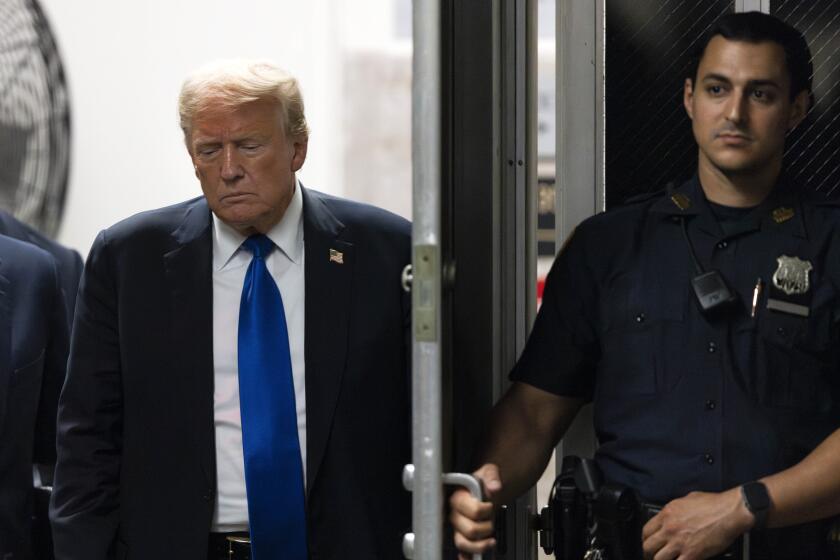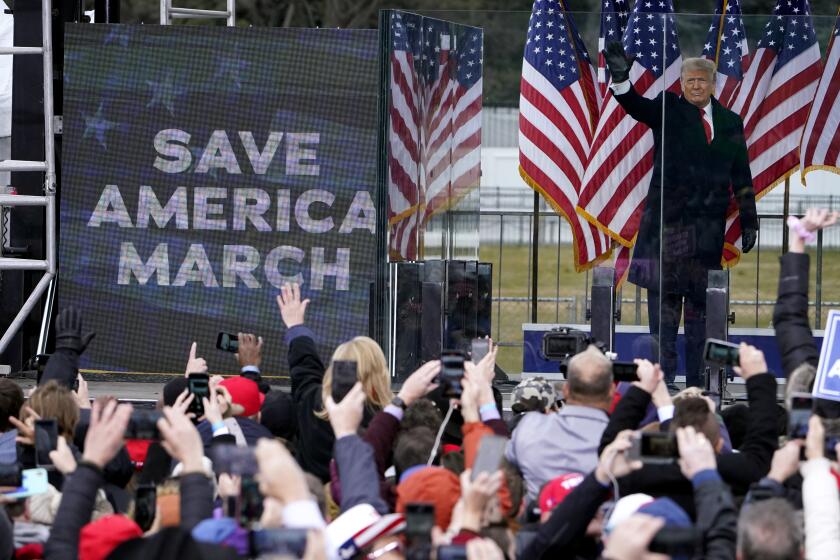Trump becomes first U.S. president sentenced as a felon

- Share via
NEW YORK — President-elect Donald Trump was sentenced Friday in his felony hush money case, but the judge declined to impose any punishment, an outcome that cements his conviction but frees him to return to the White House unencumbered by the threat of a jail term or a fine.
It was the first criminal prosecution, conviction and sentencing of a U.S. president or major presidential candidate. The New York case became the only one of the four felony criminal indictments against Trump that has gone to trial and possibly the only one that ever will. The sentencing came 10 days before his inauguration for his second term.
In roughly six minutes of remarks to the court, a calm but insistent Trump attacked the case as “a weaponization of government” and “an embarrassment to New York.” He maintained that he did not commit any crime despite the jury’s verdict last May.
“It’s been a political witch hunt. It was done to damage my reputation so that I would lose the election, and, obviously, that didn’t work,” the president-elect said by video, with U.S. flags in the background. Beside him at his Mar-a-Lago property was defense lawyer Todd Blanche, whom Trump has tapped to serve as the second-highest ranking Justice Department official in his incoming administration.
After the roughly half-hour proceeding, Trump said in a post on his social media network that the hearing had been a “despicable charade.” He reiterated that he would appeal his conviction.
Manhattan Judge Juan Merchan could have sentenced the 78-year-old Republican to up to four years in prison. Instead, he imposed a sentence that sidestepped thorny constitutional issues by effectively ending the case but assured that Trump will become the first person convicted of a felony to assume the presidency.
Jurors deliberated for 9½ hours over two days before convicting former President Trump of all 34 counts he faced in a hush-money scheme surrounding the 2016 election.
Trump’s no-penalty sentence, called an unconditional discharge, is rare for felony convictions. The judge said that he had to respect Trump’s upcoming legal protections as president, while also giving due consideration to the jury’s decision.
“Despite the extraordinary breadth of those legal protections, one power they do not provide is that they do not erase a jury verdict,” said Merchan, who had indicated ahead of time that he planned the no-penalty sentence.
As Merchan pronounced the sentence, Trump sat upright, lips pursed, frowning slightly. He tilted his head to the side as the judge wished him “godspeed in your second term in office.”
Before the hearing, a handful of Trump supporters and critics gathered outside. One group held a banner that read, “Trump is guilty.” The other held one that said, “Stop partisan conspiracy” and “Stop political witch hunt.”
The case saw the former and future president charged with 34 felonies, put on trial for almost two months and convicted by a jury on every count. Yet, the legal consequences — and sordid details aired in court of a plot to bury a sex scandal — didn’t hurt him with voters, who elected him to a second term.
“The American voters got a chance to see and decide for themselves whether this was the kind of case that should’ve been brought. And they decided,” Blanche said Friday.
Prosecutors said they supported a no-penalty sentence, but they chided Trump’s attacks on the legal system throughout and after the case.
Trump and his lawyers saw Supreme Court as a friendly forum, but it turned down his request.
“The once and future president of the United States has engaged in a coordinated campaign to undermine its legitimacy,” prosecutor Joshua Steinglass said.
Rather than show remorse, Trump has “bred disdain” for the jury verdict and the criminal justice system, Steinglass said, and his calls for retaliation against those involved in the case, including calling for the judge to be disbarred, “has caused enduring damage to public perception of the criminal justice system and has put officers of the court in harm’s way.”
The specific charges in the hush money case related to fraudulent checks and ledgers, and the underlying accusations were seamy and deeply entangled with Trump’s political rise.
Trump promised ‘all hell will break out’ in the Middle East if Israeli hostages are not returned by the time he takes office.
Trump was found to have falsified his business’ records to veil a $130,000 payoff to porn actor Stormy Daniels. She was paid, late in Trump’s 2016 campaign, not to tell the public about a sexual encounter she maintains the two had a decade earlier. He says nothing sexual happened between them, and he claimed that his political adversaries spun up a bogus prosecution to try to damage him.
Democratic Manhattan Dist. Atty. Alvin Bragg’s office, which brought the charges, said in a court filing Monday that Trump committed “serious offenses that caused extensive harm to the sanctity of the electoral process and to the integrity of New York’s financial marketplace.”
Prosecutors said Daniels was paid off — through Trump’s personal attorney at the time, Michael Cohen — as part of a wider effort to keep voters from hearing about Trump’s alleged extramarital escapades.
Trump’s lawyers had argued that he wanted to squelch the stories to protect his family, not his campaign. Prosecutors persuaded jurors that Cohen’s reimbursements for paying Daniels were deceptively logged as legal expenses, which Trump claimed they were.
The nation’s high court refuses to decide quickly on Trump’s claim that he cannot be prosecuted for the Jan. 6 attack on the U.S. Capitol.
Trump’s lawyers tried unsuccessfully to forestall a trial, and later to get the conviction overturned, the case dismissed or at least the sentencing postponed.
Trump attorneys leaned heavily into assertions of presidential immunity from prosecution, and they got a boost in July from a Supreme Court decision that affords former commanders in chief considerable immunity.
Even before his big Supreme Court win, Trump promised to be ‘dictator for one day.’ Will the ruling embolden him further?
Trump was a private citizen and presidential candidate when Daniels was paid in 2016. He was president when the reimbursements to Cohen were made and recorded the following year.
Merchan repeatedly postponed the sentencing, initially set for July. But last week, he set Friday’s date, citing a need for “finality.”
He wrote that he strove to balance Trump’s need to govern, the Supreme Court’s immunity ruling, the respect due a jury verdict and the public’s expectation that “no one is above the law.”
Trump’s lawyers then launched a flurry of last-minute efforts to block the sentencing. Their last hope vanished Thursday night with a 5-4 Supreme Court ruling that declined to delay the sentencing.
Meanwhile, the other felony criminal cases that once loomed over Trump have ended or stalled ahead of trial.
After Trump’s election, special counsel Jack Smith closed out the federal prosecutions alleging Trump’s criminal mishandling of classified documents and his efforts to overturn his 2020 election loss to Democrat Joe Biden. A state-level Georgia election interference case is locked in uncertainty after prosecutor Fani Willis was removed from it.
Sisak, Peltz, Offenhartz and Price write for the Associated Press.
President-elect Donald Trump and Russian President Vladimir Putin share some traits and want some of the same things. But a chasm divides them.
More to Read
Get the L.A. Times Politics newsletter
Deeply reported insights into legislation, politics and policy from Sacramento, Washington and beyond. In your inbox three times per week.
You may occasionally receive promotional content from the Los Angeles Times.
















